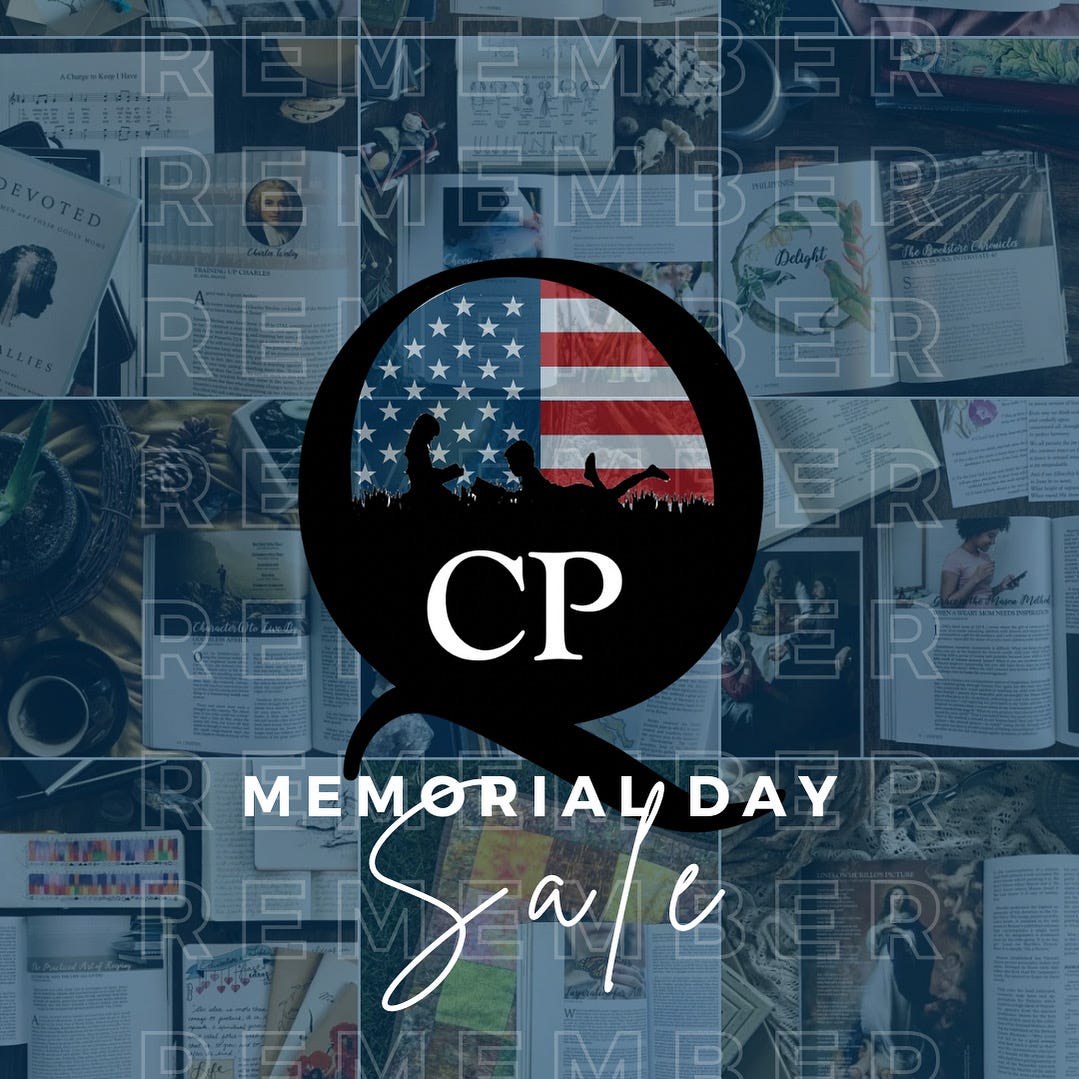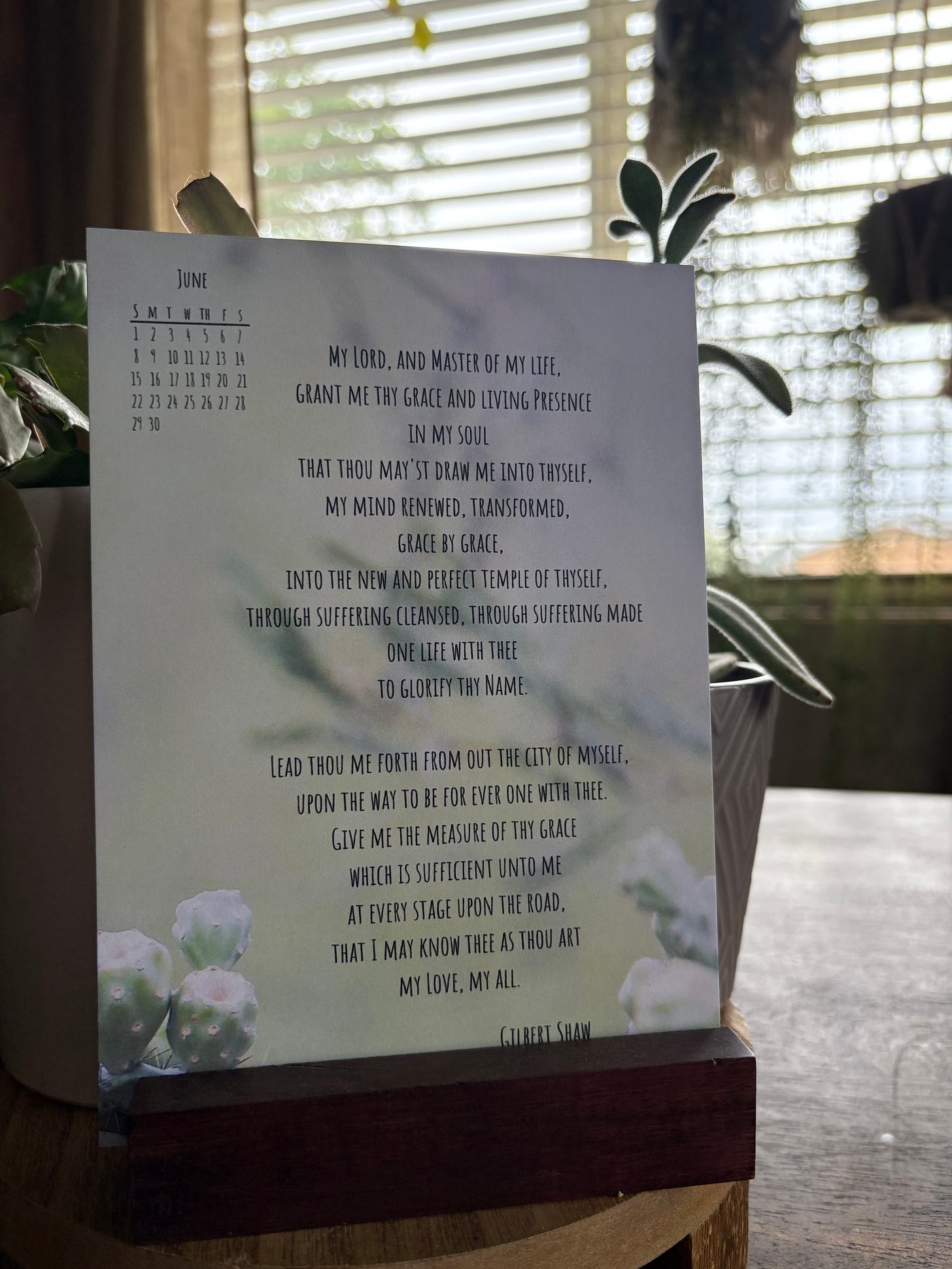Once upon a time, I was planning the next school year before the Christmas decorations were even packed away. It was always such a fun, hopeful season: new books to preread, a fresh planner to fill (or at least pretend to), and dreams of the perfect schedule where our days ran just so.
Now, here I am at the end of May, wrapping up our lessons and mostly thinking about what to cut next year. I’m wondering if we should wait one more year before tackling high school chemistry. Sometime this summer, I’ll pull out our rolling cart and shop my own shelves for Year 10 and Year 6, line up the books, and we’ll be ready.
Eventually, you reach a point where there’s not much to do but let it all come together. This is your lifestyle now. This philosophy is the breath of your home—for the most part—and life has gotten bigger. It’s not as concentrated as it once was.
That golden window when everyone is home, when color-coded spreadsheets make your heart sing—that season is a sliver of time. And there are feelings that come with that. It’s strange, honestly. A bit like impostor syndrome—but that can’t be right. I’ve been doing this for over fifteen years.
You scroll past shiny new planners and fresh booklists, content and no longer searching—but still, you remember the thrill. The thrill of prereading Churchill with a busy toddler underfoot. There’s a pang of nostalgia. And suddenly, I find myself wondering: could I make a planner work for us again? Should I dip into a new curriculum just for the fun of it? Even though I know we already have all we need—on our shelves and in our quirky rhythms—to make it work.
Every time I feel this topsy-turvy mix of emotions, I take it as a good sign: homeschooling never became an idol. But I think there’s more to it than that. The fruit of steadfastness is quietly growing in this work. It ripens into simplicity. Into a life, just as Miss Mason stated all along.
And maybe that’s what this season is about: honoring both the early enthusiasm and the quiet confidence that comes later. It’s the shift from striving to abiding. The end of the year and the beginning of the next become quiet celebrations of growth, endurance, and letting go—without losing the heart of what you love.
It’s something to look forward to.
Mariah : )
On The CPQ Blog
Behind the Scenes
Things: shipping soon!
Truth: in layout
Laugh: in copyedit
Mansoul: Year 8 is in the planning phase!
Things
In our main articles this issue we…
-learn about charts and notebooks, the things of history, and to what end we have these tools.
-are encouraged that we live in a time when technology makes it easier to learn new things, acquire quality materials, and overcome various stumbling blocks in laying a feast before our children.
-are inspired by an interview about afternoon occupations with a Charlotte Mason family
-and delight in the story of a dad who contributes to his family’s learning in the “how-to” of life skills and hobbies like blacksmithing.
The digital copy has been uploaded into SimpleCirc for all subscribers to access!
If you missed the preorder period and want to snag a copy of ‘Things,’ you can purchase a pre-order* from our shop!
*Pre-orders are not included in the current sale.
Do you have a Charlotte Mason conference coming up? Send us the information at mariah@commonplacequarterly.com, and we will share it in our monthly newsletter!
Something Borrowed
Programming is most definitely not “work in material.” I should not have brought a computer to the handicrafts fair. But where, then, does programming fit in the science of relations? It doesn’t seem to get us in touch with the great ideas of man or of God. So is it an outlier?
I think not. Rather, I think we find its home in these words of Charlotte Mason:
… we retain those studies which give exercise in habits of clear and orderly thinking. Mathematics, grammar, logic, etc., are not purely disciplinary, they do develop (if a bull may be allowed) intellectual muscle. We by no means reject the familiar staples of education in the school sense, but we prize them even more for the record of intellectual habits they leave in the brain tissue…[7]
In my life, programming has taught me much more than how to write an app. The most valuable lesson it has taught me is how fallible and illogical I am. It has taught me humility, and it has done so by humbling me.
This particular power of programming can perhaps be explained in this way: it is human nature to perceive ourselves as being fundamentally logical. Our natural tendency is to trust our reason. If it makes sense to us, then it must be true. But Mason’s 18th principle encourages us to challenge that notion. She says that reason “it is not always a safe [guide]; for, whether that idea be right or wrong, reason will confirm it by irrefragable proofs.”[8]
Memorial Day Sale
All back issues are 20% off now through the end of the month!
June Recitation Printable
Get To Know The Editors
What’s Cara…
Reading: Forgiving What You Can’t Forget, The Scarlet Pimpernel and Boys in the Boat with my older kids, who keep reading books I’ve never read before.
Eating: Asian flank steak with rice and seaweed
Making: summer memories
Drinking: iced London Fog lattes
Buying: Forever bags. At least that’s the hope. I just want some bags that I never have to replace.
Watching: gymnastics practice
Thinking about: how to keep your dreams when they have widened beyond what you thought they would become.
What’s Mariah…
Reading: A Red Herring Without Mustard by Alan Bradley, and I’m almost done with Count of Monte Cristo—finally! I’ve been working my way through it with my son since August. Plus, Growing Together by Melissa B. Kruger with some friends.
Watching: American Manhunt: Osama bin Laden on Netflix
Eating: Lemon Garlic chicken
Playing: Blueprints with the kids
Drinking: a London fog
Thinking about: how my little girl, who just had pigtails yesterday, walked across a stage and got pinned as a speech therapist this month. Don’t ask me how time works.
Learning: that I can ask ChatGPT to write my weekly menu plan and grocery list, and then use that time to take a walk, read a book, play a board game with the kids, work out with my son, or take my daughter for a coffee. It’s a much better use of my time Friday afternoons.






